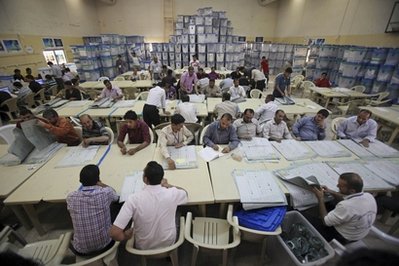Global General
Iraqi PM starts laying groundwork for new govt
(Agencies)
Updated: 2010-03-13 03:22
 |
Large Medium Small |
BAGHDAD - The Iraqi prime minister's bloc said Friday it has started laying the groundwork to form a coalition government, signaling growing confidence after preliminary election results showed it winning in at least three provinces in the southern Shiite heartland.
|
 Electoral workers sort through ballots cast in the national election in Baghdad, Iraq, Friday, March 12, 2010. Partial tallies have only been released from only five of Iraq's 18 provinces, excluding Baghdad. They show the prime minister and his secular rival, former Prime Minister Ayad Allawi, locked in a tight contest amid fraud allegations.[Agencies] |
But the outcome from the key parliamentary vote was far from certain, with election officials still counting ballots nearly a week after Iraqis went to the polls.
Partial tallies so far have been released from seven of Iraq's 18 provinces, excluding all-important Baghdad, which accounts for almost a fifth of the 325-seat parliament. The picture was further muddied Friday when the latest results showed an Iran-backed Shiite religious coalition leading in one province and al-Maliki in another.
|
||||
According to early results released Thursday, the State of Law coalition led by al-Maliki had the lead in two mainly Shiite provinces - Babil and Najaf - while his secular challenger, Ayad Allawi, was ahead in two provinces in central Iraq - Salahuddin and Diyala.
More results trickled out Friday in what has been a chaotic process in which election officials have posted tallies on TV screens at their Baghdad headquarters with little advance notice.
The electoral commission said Friday that the Iraqi National Alliance, a Shiite religious coalition made up of the Supreme Islamic Iraqi Council and followers of anti-American cleric Muqtada al-Sadr, had the lead over al-Maliki in Maysan province, which borders Iran.
With only about 23 percent of the votes counted, INA was ahead there with almost 30,000 votes to 23,000 for al-Maliki's alliance.
Results released later for Muthanna province, which borders Saudi Arabia to the south, showed al-Maliki's coalition with about 15,000 votes to roughly 11,000 for the Iraqi National Alliance. Allawi's coalition, which was not expected to seriously contend in the Shiite south, came in a distant fourth with 18 percent of the votes counted.
However, Iraqi officials who have seen results from across the country said al-Maliki's coalition appeared to have a narrow edge overall, though not an outright majority. Even the head of the Supreme Islamic Iraqi Council, Ammar al-Hakim, said late Wednesday that al-Maliki's coalition appears to be winning - the first public statement by such a high-ranking official. However, al-Hakim contended that his coalition - the INA - was in second, not Allawi's Iraqiya.










